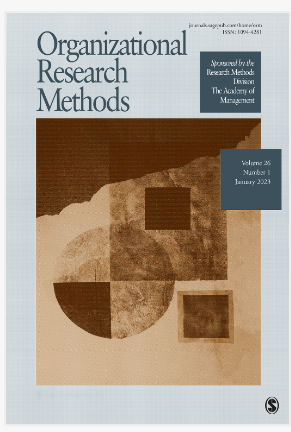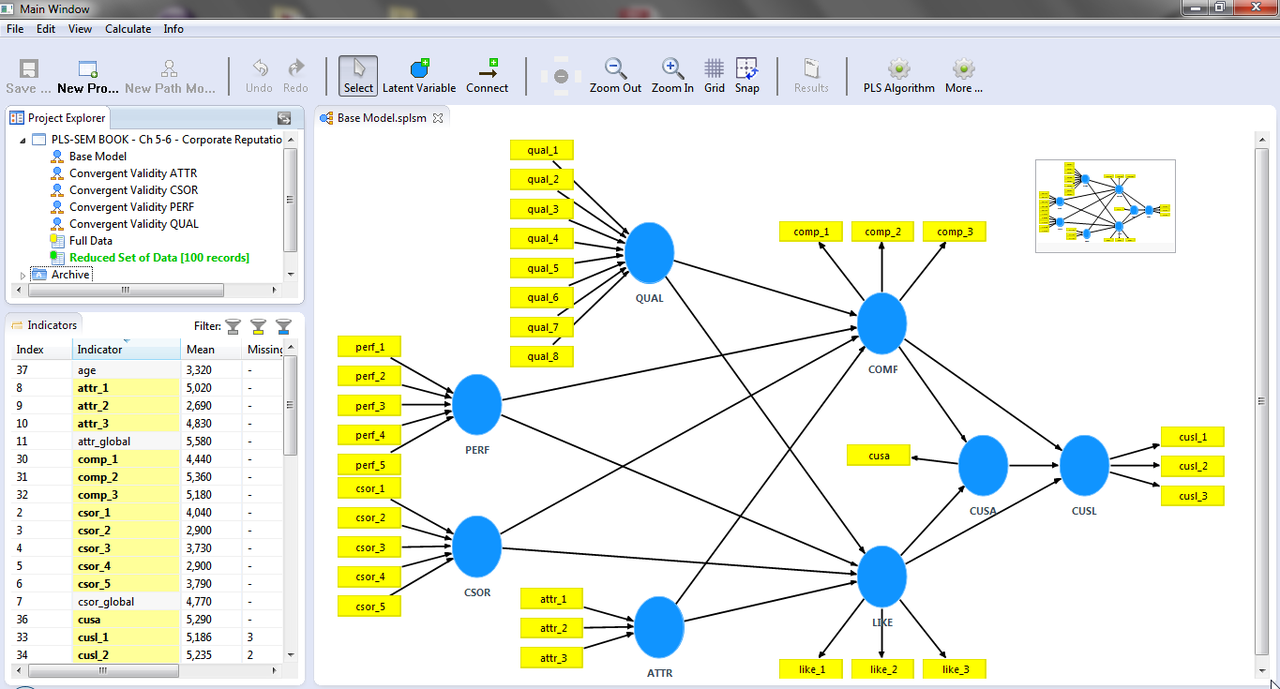Designing Literature Reviews as a Research Project
by Sven Kunisch, Associate Professor of Management, Aarhus University (Denmark), David Denyer, Cranfield School of Management, Cranfield (UK), Jean M. Bartunek, Boston College, Chestnut Hill, MA (USA), Markus Menz, University of Geneva, Geneva (Switzerland), and Laura B. Cardinal, University of South Carolina, Columbia, SC (USA)
Research design is the Methodspace focus for the first quarter of 2023. Find the unfolding series here.
Review articles have become a credible and legitimate form of scientific inquiry
in various fields of science including management and organizational sciences.

Organizational Research Methods (ORM), peer-reviewed and published quarterly, brings relevant methodological developments to a wide range of researchers in organizational and management studies and promotes a more effective understanding of current and new methodologies and their application in organizational settings.
Read these open-access articles:
Kunisch, S., Denyer, D., Bartunek, J. M., Menz, M., & Cardinal, L. B. (2023). Review Research as Scientific Inquiry. Organizational Research Methods. https://doi.org/10.1177/10944281221127292
Hiebl, M. R. W. (2021). Sample Selection in Systematic Literature Reviews of Management Research. Organizational Research Methods, 0(0). https://doi.org/10.1177/1094428120986851
See the Organizational Research Methods special issue: Rigorous and Impactful Literature Reviews.
And see more readings with subscription access:
Rousseau, D. M., Manning, J., & Denyer, D. (2008). Evidence in Management and Organizational Science: Assembling the Field’s Full Weight of Scientific Knowledge through Syntheses. Academy of Management Annals. https://doi.org/10.1080/19416520802211651
Tranfield, D., Denyer, D., & Smart, P. (2003). Towards a Methodology for Developing Evidence-Informed Management Knowledge by Means of Systematic Review. British Journal of Management. https://doi.org/10.1111/1467-8551.00375
The article “Review Research as Scientific Inquiry” promotes purpose-method-fit and offers guidance on how to improve the rigor and impact of review research.
While literature reviewing is part of any research project, reviews as a stand-alone research project seek to address academic, practice or policy problems using prior research as data sources. The diverse range of review research purposes and methods is both an opportunity and a challenge for producers and users.
In this article, Kunisch et al. identify eight general purposes: (1) classifying, (2) representing, (3) problematizing, (4) configuring, (5) aggregating, (6) integrating, (7) interpreting, and (8) explaining – and six aspects of rigor and impact – (1) design, (2) execution, (3) analysis, (4) synthesis, (5) contribution, and (6) utilization. The authors argue that the alignment of purpose and methods is crucial for producing high-quality review research.
More Methodspace Posts about Research Design
We’re excited to share that Research Methods - part of the 'Research Skills Toolkit' - has been updated to reflect today’s research landscape. Discover brand new content on Gen AI, Data Literacy and more – designed to support researchers with the skills they need in their careers.
There are some perennial challenges to doing a research project that all of us have faced: formulating a research question, wrestling with paradigmatic assumptions, keeping on track of a multi-year project. The Essential Guide to Doing Your Research Project has been helping students (and supervisors) for more than 20 years. But in a post-pandemic world with the transformations being wrought by artificial intelligence, datafication, and the rise and fall of social media platforms, there are new challenges facing researchers.
We are thrilled to announce the launch of the Research Design and Planning video collection, a powerful new resource designed to equip researchers with the essential tools and insights to craft high-impact research projects. Whether you're a student, academic, or professional researcher, this collection is your go-to guide for mastering the art and science of research design.
Guest post from Christopher Lamont and Mieczyslaw P Boduszynski , authors of Research Methods in Politics and International Relations, on the importance of methodology in PIR research.
While some types of online research use communication tools to interact with remote participants, digital methods use online approaches to study online phenomena.
This collection of open access articles offers multidisciplinary examples, guidance, and perspectives about online experimental research.
How do you know online participants are who they say they are? This collection of articles explores the issues - and solutions.
The wealth of material available online is irresistible to social researchers who are trying to understand contemporary experiences, perspectives, and events. The ethical collection and -use of such material is anything but straightforward. Find open-access articles that explore different approaches.
How to protect data when recording interviews on videoconference platforms.
The public is exposed to news stories about bad academic research behavior online. How can we counter this narrative and build credibility?
There are lots of questions to consider when using videoconference platforms for scholarly interviews.
From the moment social media platforms began to welcome user-generated content, researchers have looked for ways to study it. Learn more with open-access articles about social media platforms.
Julianne Cheek and Elise Øby, co-authors of the book Research Design: Why Thinking About Design Matters, discuss how to make decisions about what qualitative, quantitative, or mixed methods data to collect and how to do so. This post is the third of a three-part series of posts that feature ten author interviews.
What if we didn’t have to go fast to do our academic work and research? What if we could embrace the spaces and places around us to slow down? What could that mean for us personally, professionally, and in how we relate to social justice and ecological issues?
Julianne Cheek and Elise Øby, co-authors of the book Research Design: Why Thinking About Design Matters, discuss how to make decisions about methodology in this collection of video interviews. This post is the second of a three-part series of posts that feature ten author interviews.
Chart research directions that take you to the roots of the problem. Learn more in this guest post from Dr. Donna Mertens.
We need to think about research before we design and conduct it.
Julianne Cheek and Elise Øby, co-authors of the book Research Design: Why Thinking About Design Matters, discuss the first three chapters in these video interviews:
Chapter 1 – Research Design: What You Need to Think About and Why
Chapter 2 – Ethical Issues in Research Design
Chapter 3 – Developing Your Research Questions
The process for researching literature on research methods is somewhat different from the process used for researching literature about the topic, problem, or questions. What should we keep in mind when selecting methods literature?
Partial least squares structural equation modeling (PLS-SEM) enables researchers to model and estimate complex cause-effects relationship models
How do researchers make design decisions about the methodology and methods?
In-depth comprehension and interpretation of social events, human experiences, and behaviours are often the main goals of qualitative researchers. Learn about the primary concerns of qualitative researchers in this guest post by Pinaki Burman.
Research can often feel like an overwhelming process. If you are a novice researcher, there can be a lot of new terminology to learn too. This is where research road mapping can help!
These difficult times present challenges for researchers. Find five original posts by Robert Kozinets about using Netnography to study sensitive topics.
Looking back at 2023, find all posts here!
We explored stages of a research project, from concept to publication. In each quarter we focused on one part of the process. In this recap for the year you will find original guest posts, interviews, curated collections of open-access resources, recordings from webinars or roundtable discussions, and instructional resources.
Methods Film Fest!
We can read what they write, but what do researchers say? What are they thinking about, what are they exploring, what insights do they share about methodologies, methods, and approaches? In 2023 Methodspace produced 32 videos, and you can find them all in this post!
Let’s begin this quarter’s exploration of research design by thinking about the research problem or topic. Who decides what to study?



























Informed consent is the term given to the agreement between researcher and participant. In this post Janet Salmons offers suggestions about the intersections of the Internet communications, ethics and participants.